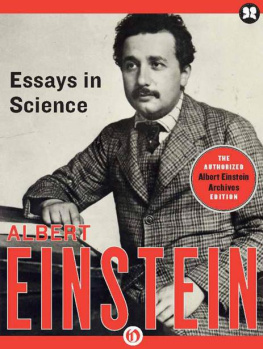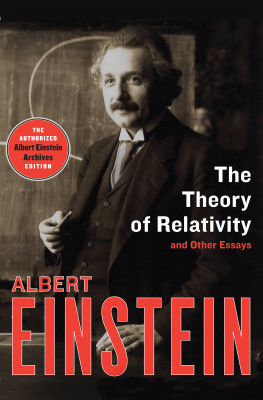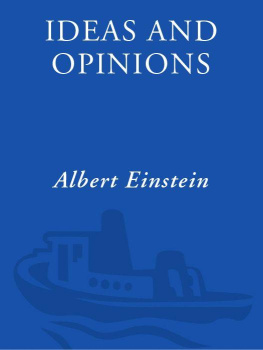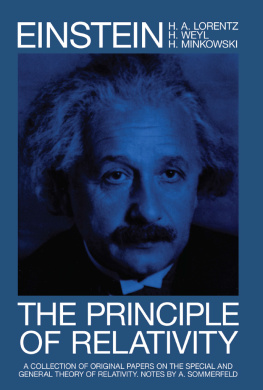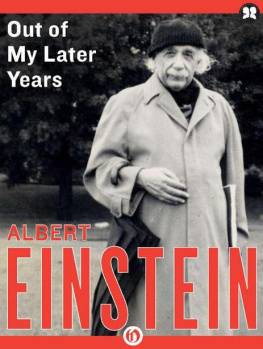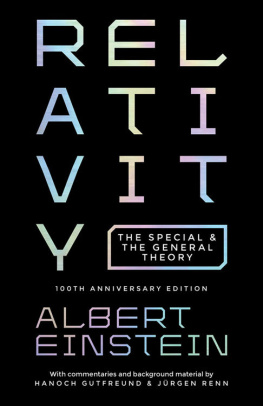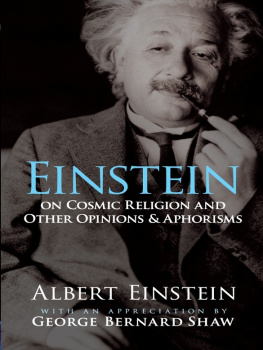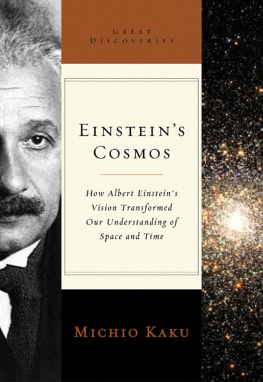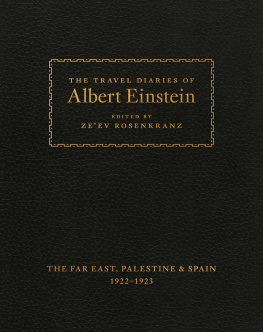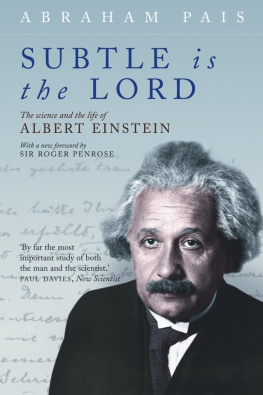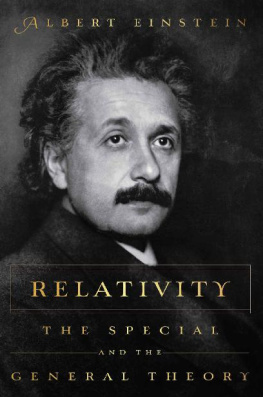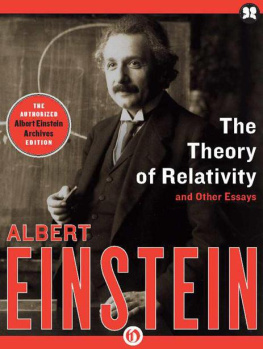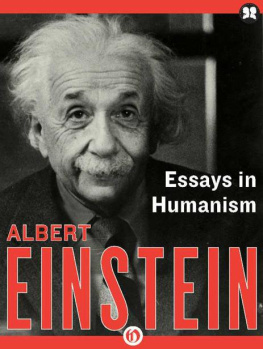Albert Einstein - Essays in Science
Here you can read online Albert Einstein - Essays in Science full text of the book (entire story) in english for free. Download pdf and epub, get meaning, cover and reviews about this ebook. year: 2011, publisher: Philosophical Library/Open Road, genre: Science. Description of the work, (preface) as well as reviews are available. Best literature library LitArk.com created for fans of good reading and offers a wide selection of genres:
Romance novel
Science fiction
Adventure
Detective
Science
History
Home and family
Prose
Art
Politics
Computer
Non-fiction
Religion
Business
Children
Humor
Choose a favorite category and find really read worthwhile books. Enjoy immersion in the world of imagination, feel the emotions of the characters or learn something new for yourself, make an fascinating discovery.
- Book:Essays in Science
- Author:
- Publisher:Philosophical Library/Open Road
- Genre:
- Year:2011
- Rating:5 / 5
- Favourites:Add to favourites
- Your mark:
- 100
- 1
- 2
- 3
- 4
- 5
Essays in Science: summary, description and annotation
We offer to read an annotation, description, summary or preface (depends on what the author of the book "Essays in Science" wrote himself). If you haven't found the necessary information about the book — write in the comments, we will try to find it.
Essays in Science — read online for free the complete book (whole text) full work
Below is the text of the book, divided by pages. System saving the place of the last page read, allows you to conveniently read the book "Essays in Science" online for free, without having to search again every time where you left off. Put a bookmark, and you can go to the page where you finished reading at any time.
Font size:
Interval:
Bookmark:
Essays in Science
Albert Einstein

Contents
ALBERT EINSTEIN WAS THE greatest physicist of the twentieth century. His image and name are recognizable to almost everyone, along with his equation E=mc2 , which describes the relationship between energy and mass. His impact on science and intellectual thought during his lifetime was profound.
This volume contains a collection of sixteen essays written before 1935, when Einstein was at the height of his scientific powers but not yet known as the sage of the atomic age. His stature in the world allowed him to express his views on philosophical issues relating to the field of physics. These essays established his early foray into this area.
Why are we so interested in all aspects of Einsteins philosophical positions and his thought processes? His theories of relativity and universal gravitation are generally regarded as inaccessible to the ordinary person. Yet we know that he was an original thinker who was able to see beyond the conventional scientific worldview of his age. What is remarkable is that Einsteins greatest discoveries belong to him alone. It is perhaps fitting that this volume is being published one hundred years after Einstein settled the question of why the sky is blue. What we see is a giant intellect struggling as an ordinary person to make sense of the realities of life in the twentieth century.
This volume concentrates on the essays on science that Albert Einstein included in the first authorized edition of Mein Weltbild . These essays had an amazing breadth and made many fundamental points about the nature of the universe. The central theme answered the question of how Einstein came to his theories. He believed that the only source of knowledge was experience, and that in the case of general relativity such experience did not always suggest the scientific truth of a theory. The development of a theory depended on only intuition resting on a sympathetic understanding of experience. It was the object of all theory to make the irreducible elements as simple and few in number as possible. He was convinced that we can discover by purely mathematical constructions [] the key to the understanding of natural phenomena. Experience suggests, the mind constructs (with the help of mathematics), and experience confirms.
Einstein bolstered his argument by tracing the development of various universal theories of science and the advances that these theories brought to our ability to understand the world. Euclids geometry gave the human intellect the confidence in itself for subsequent achievements. Purely logical thinking [such as Euclid] cannot yield us any knowledge of the empirical world. Galileo and Kepler showed that all knowledge of reality starts from experience and ends in it. And Newton still believed that the basic laws of his system could be derived from experience.
Further, in his essay On Scientific Truth , the idea of a superior mind as conceived in Spinozas pantheistic religion revealing itself in the world of experience represented Einsteins conception of God.
Spinozas metaphysics created a world view which was in conflict with the idea of an ever-expanding universe as predicted by an early version of the generalized relativity theory. By 1919, Einstein had amended his general theory of relativity to include a cosmological term so that the universe would be spatially self-enclosed as outlined in On the Theory of Relativity . In 1929, Edwin Hubble verified by astronomical observations that the universe was expanding and consequently there was at some time a big bang. Had Einstein not added the cosmological term and accepted his early version of the generalized relativity theory the expanding universe would perhaps have been his greatest predication.
With the advent of Maxwell, Faraday, Hertz, and Lorentz there was a shift from description of material points to electro-magnetic fields, which became the ultimate entity. According to Einstein the development of field theory led directly to the special theory of relativity once he realized that field theory creates reciprocal actions between bodies [] by processes which are propagated through space at a finite speed. Such fields ruled out the existence of forces acting at a distance, with the resulting destruction of the notion of absolute simultaneity. Einstein felt that a final leap had to be made to develop the general theory of relativity. Such a theory can no longer be based on observation and reality. The theory must first be conceived through intuition by making the theory as simple as possible and then checked to see if it fits reality. It happens that generalized relativity depends heavily on mathematical constructions due to Riemann, Ricci, and Levi-Civita, which were already known. It is clear that Einstein felt that he would not have been able to complete his theory without their mathematical constructions.
Where does quantum mechanics fit into all this? Can field theory find a way to include quantum mechanics? Can there be a unified field theory? In 1934, Einstein had hope of finding a solution but spent the remainder of his life looking unsuccessfully for it.
Another interesting thread throughout Essays in Science involved the use of mathematics in developing a theory of reality. Starting with Euclid, the mathematics was whole unto itself. This was followed by Kepler, who developed the motion of the planets using circles and ellipses, which exhibit the simplest conceivable form of regularity. According to Einstein, Keplers achievement is a particularly fine example of the truth that knowledge cannot spring from experience alone but only from the comparison of inventions of the intellect with observed facts. Keplers laws represented integrals of the motion. Newtons mechanics required the development of the calculus, ordinary derivatives, and differential equations. Field theory required partial derivatives. And finally, general relativity required the Rici calculus and the concept of invariant derivatives, which were independent of the geometry of space.
In the essay The Cause of the Formation of Meanders... Einstein used simple arguments to give the elementary principles involved [and a] short qualitative exposition of them. In the next pages he used thought experiments to prove his thesis. Together with the following essay, The Flettner Ship, they provide outstanding examples of Einsteins mind at work.
Einsteins connection to all things German, and in particular the scientific community in Berlin, through his appointment to the Kaiser Wilhelm Institute for Physics, made it very painful for him to give up his German citizenship. Throughout his years in America he sought the friendship and association with German Jews. Through this connection he developed a deep friendship with Dr. Dagobert D. Runes, the founder of Philosophical Library, who had written his doctoral dissertation on Spinoza. Many of Einsteins essays were subsequently published by Philosophical Library, which is now reissuing this volume.
Neil Berger
Associate Professor Emeritus of Mathematics
University of Illinois at Chicago
August 2010
The World as I See It in its original form includes essays by Einstein on Judaism, Germany, Politics and Pacifism and sundry other topics. These have been omitted in the present abridged edition. The object of this reprint is simply to give the general reader an opportunity to examine some of the distinguished scholars papers dealing with science.
to the original edition, entitled The World as I See It
ALBERT EINSTEIN IS ONE of the most modest people in the world. In the letters and papers in this book he constantly refers to his accidental fame and his unearned popularity. So deep-rooted is this feeling that he has merely tilled his own row, howbeit that row was an inconceivably fertile one, that for many years his friends and intimates were unable to prevail upon him to publish his letters, papers and speeches, although opportunities and requests were showered on him. Even his scientific articles he would release to none save academic journals that do not reach the general public. The imagination of the world is stirred by the name of Albert Einstein, and yet hitherto it has had only the scantiest material to feed upon. Occasional, all-too-brief interviews; a few instances where Einstein suppressed his modesty for the sake of some great humanitarian cause; and the famous four-page pamphlet on the special theory of relativity.
Next pageFont size:
Interval:
Bookmark:
Similar books «Essays in Science»
Look at similar books to Essays in Science. We have selected literature similar in name and meaning in the hope of providing readers with more options to find new, interesting, not yet read works.
Discussion, reviews of the book Essays in Science and just readers' own opinions. Leave your comments, write what you think about the work, its meaning or the main characters. Specify what exactly you liked and what you didn't like, and why you think so.

